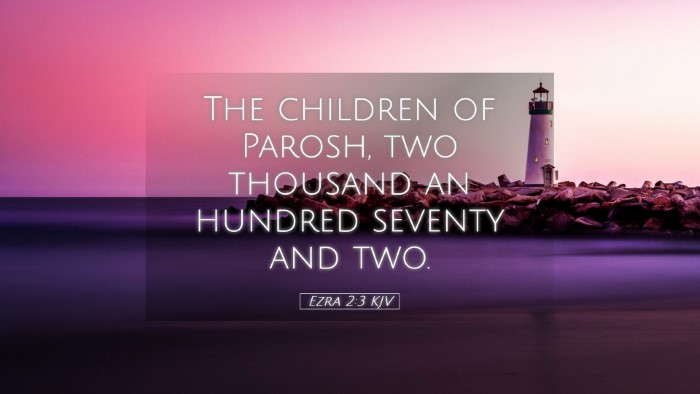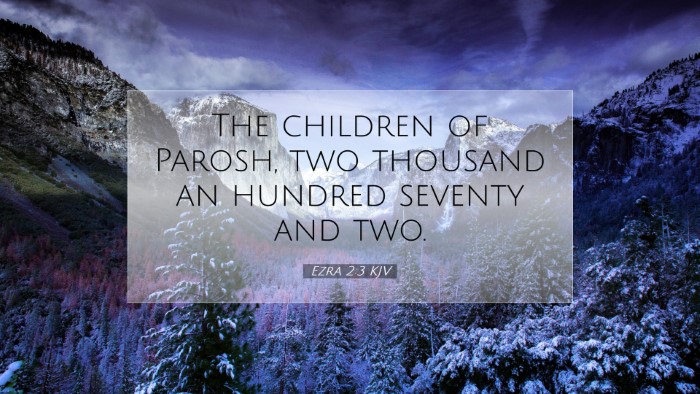Commentary on Ezra 2:3
Verse: “The children of Parosh, two thousand a hundred seventy and two.” (Ezra 2:3)
Introduction
Ezra 2:3 marks the beginning of the genealogical list that details the return of the exiles to Jerusalem after their Babylonian captivity. This verse specifically names the children of Parosh, highlighting their number as two thousand one hundred seventy-two. Understanding this passage requires a deeper look into its historical context, significance, and theological implications.
Historical Context
In the books of Ezra and Nehemiah, we find the historical account of the Jewish people's return from exile, a significant event in the Hebrew Scriptures. After being taken captive by the Babylonians, many Israelites longed for their homeland. They were summoned to return under the edict of Cyrus the Great, King of Persia, who recognized the importance of restoring the temple and the Jewish identity.
Analysis of the Verse
Matthew Henry emphasizes the importance of genealogies in Scripture, noting that they provide a legal claim to the land and temple privileges. The children of Parosh represent not just a number, but a lineage that connects back to the covenant promises made to Israel. His observation leads to an understanding that God values each individual, as seen in the meticulous recording of names and numbers.
Albert Barnes adds that the mention of the families and their numbers serves to encourage the returning exiles. Seeing their numbers verified can instill a sense of unity and purpose for the journey ahead. This was not merely a physical return, but a spiritual reawakening.
Adam Clarke stresses the significance of the families listed. He notes that the name 'Parosh' means “the flea,” and this may symbolize the humble beginnings of those returning. Despite their lowly associations, they were called to participate in the rebuilding of Jerusalem, underscoring the theme that God uses the insignificant to fulfill His divine purposes.
Theological Implications
The return of the exiles as detailed in Ezra stands as a testimony of God's faithfulness. The specific naming of families like that of Parosh illustrates the covenantal relationship between God and His people. This covenant is not merely collective but personal; each person matters in God’s plan.
- God’s Sovereignty: This passage illustrates God’s overarching control over history and nations, directing the hearts of kings to fulfill His purpose.
- Identity and Restoration: The detailed genealogies affirm the identity of the returning exiles. In re-establishing themselves as God’s chosen people, they reclaim their heritage and purpose.
- The Importance of Community: The return is not an individual endeavor but a communal mission. The mention of families emphasizes the need for collective effort in restoration.
Practical Applications
This verse holds several practical lessons for Christians today:
- Value of Every Individual: Just as each name in the genealogy is important, every believer is precious in the sight of God and has a role to play in the church.
- Encouragement in Community: Like the returning exiles, churches should see the importance of unity and collective action in fulfilling their mission.
- Faithfulness in Adversity: The return from exile was fraught with challenges. Believers are reminded to trust in God’s faithfulness amid their struggles.
Conclusion
Ezra 2:3 serves as a significant reminder of God’s faithfulness to His covenant and the role of the community in God’s redemptive work. The listing of the children of Parosh encourages both individuals and the church today to recognize their part in the larger narrative of God’s plan. In understanding our heritage as believers and embracing our communal identity, we can navigate the journey ahead filled with purpose and faith.


